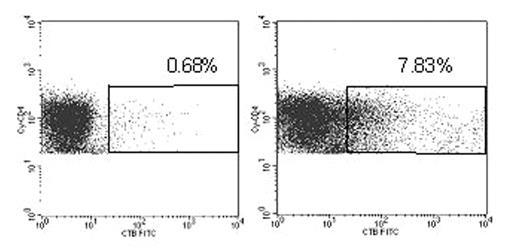Abstract
In the immunocompromised host adenovirus may cause fatal infections, especially after stem cell transplantation. No effective antiviral medication exists for severe adenoviral infection. Adoptively transferring adenoviral (Adv) specific T-cells from the donor into the patient may be a promising treatment, but requires the identification of these cells. The aim of the study was to induce Adv-specific cells in response to recently detected pan-DR binding CD4+ T-cell epitopes of adenovirus serotype 5. Epitopes were selected by using a computer algorithm designed to predict HLA pan-DR binding T-cell epitopes. Peripheral blood mononuclear cells (PBMCs) of 26 healthy adults were incubated with 19 different 15-mer peptides. Proliferation expressed as Stimulation Index (SI) was determined. Five peptides with highest SI derived from fiber protein, E1B protein, hexon protein (2 peptides) and DNA-polymerase were selected. To induce Adv-specific T-cells PBMCs from healthy subjects were either cultured with complete inactivated adenovirus for 11 days and restimulated with the different peptides for 3 days (n=10) or directly cultured with the peptides for 7 days (n=10). The cytokine profile induced by these epitopes was determined with multiplex immunoassay (MIA). By using the T-cell capture (TCC) method1 and FACS-sorting it was possible to capture the Adv-specific T-cells for further characterization by PCR and FACS analysis. In comparison with medium and irrelevant Adv-peptides PBMCs cultured with the 5 selected Adv-peptides induced significant larger amounts of Adv-specific CD4+ T-cells and showed a predominant pro-inflammatory cytokine profile. This suggests that peptides are naturally processed. By using TCC Adv-peptide specific CD4+ T-cells were identified and sorted. The Adv-specific T-cells displayed a high expression of TGF-1b, IFNg and Tbet (Th1 response), but also in lesser extent GATA3 and IL10 (Th2 response). A majority of the CD4+ Adv-specific cells expressed perforin and granzyme B, indicating that these CD4+ T-cells play an essential role in adenoviral infections. The induction of a specific immune response to adenovirus and subsequent capture of the Adv-specific T-cells is an important step towards adoptive immunotherapy in case of Adv-infections in the immunocompromised host.
Induction of adenoviral specific T-cells (CD4, CTB double positive cells) in response to Adv-peptides. 1A) Induction of CD4+ Adv-specific in response to medium stimulated PBMCs and 1B) in response to a peptide derived from hexon protein.
Induction of adenoviral specific T-cells (CD4, CTB double positive cells) in response to Adv-peptides. 1A) Induction of CD4+ Adv-specific in response to medium stimulated PBMCs and 1B) in response to a peptide derived from hexon protein.
Author notes
Corresponding author


This feature is available to Subscribers Only
Sign In or Create an Account Close Modal